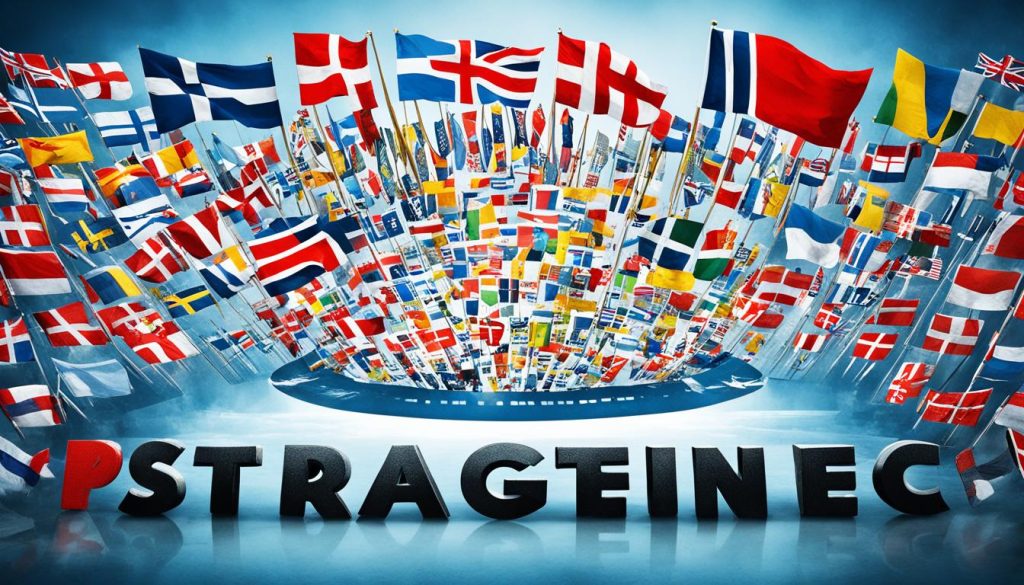The Nordic region includes Denmark, Norway, Sweden, Finland, and Iceland. It’s known for its unique business practices. These practices make Nordic companies stand out from the big multinational corporations. The blend of innovation, efficiency, and fairness in the Nordic business model is especially interesting in international business.
In Scandinavia, businesses work on trust, teamwork, and taking care of the environment. This is quite different from the often top-down approach found in global trade. Exploring the differences between Nordic countries and multinational businesses reveals how Nordic practices influence and are influenced by global trade.
Key Takeaways
- The Nordic business model focuses on innovation, efficiency, and egalitarian values.
- Scandinavian corporate culture promotes trust, cooperation, and sustainability.
- Nordic business practices differ significantly from multinational companies.
- Understanding these differences is crucial in the context of international business.
- These practices are dynamically influenced by international trade dynamics.
Introduction to Nordic Business Environments
The Nordic region includes Sweden, Denmark, Norway, Finland, and Iceland. It is known for strong economies and social policies. These countries are noted for economic stability and innovative businesses. They use a great social welfare system and are open in their business dealings, attracting companies globally.
Overview of the Nordic Region
Geographically, the Nordic region holds major influence in Europe. Its economies are among the strongest, showing that wealth can go hand in hand with good living standards. Nordic countries are famous for their social welfare. This includes health care, education, and social security. Such programs create a stable setting for businesses to grow.
Key Characteristics of the Nordic Business Model
Transparency and sustainability are pillars of the Nordic business model. Firms in this area must follow strict reporting rules. This builds trust with investors and ensures companies are responsible. Furthermore, these businesses pay attention to their impact on society. This focus helps balance profits with positive societal contributions, encouraging innovation and growth.
Companies in the Nordic area tend to be successful for several reasons. They face less disruption from social or economic problems thanks to clear regulations. Also, the market is attractive to foreign investors. This is because Nordic business practices meet global standards of fairness and transparency.
What is Nordic Countries vs Multinational Business?
The term ‘Nordic Countries vs Multinational Business’ looks into how Nordic countries and big international companies do business differently. It shows the unique management, how they enter new markets, and handle international trade compared to each other.
Nordic countries include Denmark, Norway, Sweden, Finland, and Iceland. They are known for certain business ways like having a flat structure in companies, giving power to employees, and caring a lot about nature. On the other hand, big international companies usually have a strict top to bottom order. They focus on growing fast and cutting costs to stay ahead worldwide.
When it comes to international trade, Nordic companies aim for steady growth. They believe in strong, lasting partnerships with firms in other countries. Meanwhile, big international businesses try to get into new markets quickly. They often buy other companies or merge with them to make their brand known in many places.
This difference in approach shows clearly when we compare them on several points:
| Aspect | Nordic Companies | Multinational Companies |
|---|---|---|
| Management Style | Flat Organisational Structures | Top-Down Hierarchies |
| Growth Focus | Sustainable and Balanced Growth | Rapid Expansion |
| Cross-Border Commerce | Long-Term Relationships | Aggressive Market Penetration |
| Employee Empowerment | High | Variable |
By looking at these key points, it’s clear how Nordic and international firms are different. Nordic firms work towards long-lasting success. They care a lot about sustainability and their employees. In contrast, big international companies focus on being known in many places fast. They often look at quick wins over lasting benefits.
Regional Economic Strengths

The Nordic region stands out for its strong economies. This strength comes from solid GDP growth and a mix of various economic activities. Sweden, Denmark, Norway, Finland, and Iceland show a good balance between old industries and modern sectors.
GDP and Economic Diversity
Nordic countries boast an economy with many different sectors such as manufacturing, renewable energy, and services. This variety helps their economies grow steadily, making them resilient and stable. They are known for their high incomes per person and low jobless rates when compared to others.
| Country | GDP Growth Rate | Main Economic Sectors |
|---|---|---|
| Sweden | 2.0% | Manufacturing, Services, Technology |
| Denmark | 1.8% | Agriculture, Pharmaceuticals, IT |
| Norway | 1.5% | Oil and Gas, Seafood, Tourism |
| Finland | 2.2% | Forestry, Electronics, Machinery |
| Iceland | 2.5% | Tourism, Fisheries, Aluminium Production |
Role of Innovation and Technology
Innovation and technology greatly support the Nordic region’s economy. These countries have innovation ecosystems that encourage entrepreneurship and growth. For instance, Sweden’s Spotify and Denmark’s green technologies show how they lead in technological advancements. They invest in research and development, setting high standards in various domains and enriching their economic success.
Corporate Culture in Nordic Countries
The work culture in Nordic countries stands out for balancing work and life well. They use flat organisational structures effectively. This approach boosts employee happiness, increases productivity, and keeps staff turnover low. Learning from their culture can show global businesses how to improve.
Work-Life Balance
In Nordic countries, balancing work and personal life is key. They focus on making work flexible, offer long parental leaves, and give plenty of holiday time. These practices create a supportive workplace. They lead to happier workers and set an example for forward-thinking employment policies.
Flat Organisational Structures
Scandinavian work culture is built on flat organisational structures. They aim to make companies less hierarchical. This promotes open talks and teamwork in making decisions. By doing so, employees feel important and respected. This in turn, increases job satisfaction and involvement.
Impact of Globalisation on Nordic Businesses
Globalisation has reshaped how Nordic countries do business. Companies from Denmark, Sweden, Norway, Finland, and Iceland are reaching beyond their borders. They face the challenge of adapting to the global market while finding opportunities for growth.
Nordic companies like IKEA and Volvo have made their mark worldwide, showing the strengths of their business models. Even smaller firms are finding success internationally. This has proved beneficial for both big corporations and small to medium-sized enterprises (SMEs).
But, globalisation brings its hurdles. Nordic firms must adapt to various international trade policies, requiring careful planning and resources. For instance, EU regulations significantly impact how they operate, making it vital to develop strong compliance strategies.
Increased competition is another outcome of globalisation for Nordic businesses. To stay ahead, they must innovate and improve what they offer. Firms like Ericsson are using technology to keep their competitive edge in the international market.
The table below shows the positives and negatives that come with globalisation for Nordic companies:
| Opportunities | Challenges |
|---|---|
| Access to larger markets | Compliance with international trade policies |
| Increased brand visibility | Heightened competition |
| Potential for collaborative partnerships | Adapting to diverse consumer preferences |
| Enhanced innovation through global influence | Resource allocation for market expansion |
The effects of globalisation on Nordic companies cover many areas. By accepting these changes, Nordic firms can flourish in a connected global community.
Advantages of Operating in Nordic Countries

Running a business in the Nordic countries offers many benefits. They boast a high quality of life, top-notch infrastructure, and great schools. This makes the region a top choice for companies looking to invest abroad. These factors together make a business environment that helps companies grow and innovate.
High Quality of Life
The Nordic countries are known for their excellent quality of life. They offer fantastic healthcare, strong social security, and beautiful nature. This attracts people to move there. This means businesses can easily find and keep highly skilled employees.
Strong Educational Systems
The schooling in the Nordic countries is among the world’s finest. It encourages critical thinking, creativity, and solving problems. This benefits companies by providing a workforce that is educated and inventive. This gives companies an advantage in their industries.
Advanced Infrastructure
Another major benefit for businesses in the Nordic region is its advanced infrastructure. It includes excellent transport and the latest digital technology. This makes doing business smooth and efficient. Good infrastructure is key for successful logistics, communication, and growth.
In conclusion, operating in the Nordic countries offers more than just economic advantages. The outstanding life quality, education systems, and infrastructure make a supportive environment for business. This attracts and keeps investors interested in the region.
Challenges Faced by Multinational Businesses in Nordic Countries
When multinational companies enter the Nordic region, they face many challenges. One major hurdle is understanding and following the local tax systems. This is because tax laws in Nordic countries can be complicated and vary widely.
Nordic consumers prefer sustainable and ethically run businesses. Companies from outside need to adjust their approaches to meet these expectations. If they don’t, they might find it hard to get into the market.
Entering the market is another big challenge. Companies need to understand the local business environment and competition. This includes knowing about the rules and pressures that are unique to the area.
To deal with these issues, many companies take specific steps. They hire people from the area and work with local experts. This helps them understand the laws and culture better. Using new technology also helps with efficiency and following the rules.
Effective strategies for entering the market include:
- Working with local consultants to learn about taxes in the Nordic countries.
- Changing marketing to match what Nordic customers care about.
- Joining forces with local businesses to make entering the market easier.
Here is a way multinational companies can tackle these challenges effectively:
| Challenge | Strategy | Outcome |
|---|---|---|
| Business adaptation challenges | Investing in local talent | Enhanced cultural integration |
| Nordic taxation | Hiring specialised tax consultants | Improved compliance and financial efficiency |
| Market entry difficulties | Partnerships with regional firms | Smoother market penetration |
Regulatory Environment
The Nordic countries stand out for their strong legal rules that shape how businesses run. Their focus on being fair and sustainable is a key part of the Nordic legal framework. Let’s explore what makes their regulations different.
Labour Laws and Workers’ Rights
In the Nordics, worker’s rights are taken very seriously. They have rules that protect jobs, ensure fair pay, and provide good working conditions. For example, places like Sweden and Denmark have great parental leave policies. This shows they really value the balance between work and home life.
Trade unions also have a big role. They help get fair work agreements and stand up for the rights of workers. This makes these countries top places for employee rights.
Environmental Regulations
Sustainable business is a big deal in the Nordic legal system too. Norway and Finland, for example, have tough policies on lowering pollution and encouraging green energy. If you have a business there, you need to follow these strict rules. This helps protect the environment and makes Nordic businesses known for being green leaders.
Having these kind of rules gives businesses a boost by sparking innovation and supporting growth that lasts. The way the Nordics run things shows how you can have a strong economy and still take care of people and the planet.
Strategic Partnerships and Alliances

In the Nordic area, partnerships and teamwork have been key to economic progress and new ideas. Companies have joined forces to reach more customers and get ahead of competitors. They’ve also built a strong web of support and shared resources.
Ericsson and Nokia, big names in telecommunication, show how powerful partnerships can be. Together, they’ve pushed 5G technology far ahead. This has made the Nordic area a leader in telecom innovations around the world.
In the car industry, we see more amazing partnerships. Volvo and Scania have worked together on green transport solutions. Their teamwork has led to major leaps in technology. It also encouraged more eco-friendly transport methods in and outside the region.
| Industry | Companies Involved | Focus Area | Outcome |
|---|---|---|---|
| Telecommunications | Ericsson, Nokia | 5G Technology | Increased global market share and innovation |
| Automotive | Volvo, Scania | Sustainable Transport | Advancements in eco-friendly vehicle technologies |
But it’s not just the big companies that gain from partnerships. Smaller businesses in the Nordic region have also joined in. Partnering with bigger companies or other small businesses has helped them overcome challenges and find new ways to grow.
Partnerships prove to be a powerhouse in the Nordic business world. They show us that working together with a common goal can drive industries towards innovation and steady growth.
Success Stories of Multinational Companies in Nordic Countries
The Nordic region shines as a hub for multinational triumphs, especially in tech and healthcare. Innovation is a major driver in these sectors. They show us how change and smart investment can create success.
Case Study: Technology Sector
The tech scene in the Nordics has grown impressively. Take Ericsson, a big name in Swedish telecoms, as an example. Its push into 5G tech has set a global benchmark, thanks to the Nordics’ focus on top-notch infrastructure and tech smarts.
Spotify, from Stockholm, is another big story. It has changed music streaming with its innovative approach. This story shows that Nordic startups can grow into big global players, making a mark in the Nordic tech world.
Case Study: Healthcare Sector
In healthcare too, the Nordics have seen big wins by multinational firms. Novo Nordisk from Denmark leads in diabetes care with its cutting-edge work. They’ve teamed up with local labs, pushing them to the forefront of innovation.
Philips Healthcare stands out in Finland for its work in medical tech. They’ve used Nordic know-how in medical research to lead in advanced medical imaging. It highlights how key healthcare innovation is for multinational success in the Nordics.
These stories bring to life the way companies have leveraged the Nordics’ unique strengths. Their successes in tech and healthcare are proof of the region’s role in fostering global business leaders.
| Company | Sector | Key Achievement |
|---|---|---|
| Ericsson | Technology | Global 5G Innovation |
| Spotify | Technology | Revolutionising Music Streaming |
| Novo Nordisk | Healthcare | Advancements in Diabetes Care |
| Philips Healthcare | Healthcare | Advanced Medical Imaging |
Role of Small and Medium Enterprises (SMEs) in Nordic Economies
The Nordic business ecosystem relies heavily on Small and Medium Enterprises (SMEs). These firms are key in driving entrepreneurship and innovation. They are a major force in the economy of the Nordic countries.
SMEs are essential for economic growth, creating jobs, and bringing new tech to the market. They form a large part of the business scene.
The SME contribution to Nordic economies gets a lot of support. This includes financial aid, tax breaks, and advice for businesses. Such help boosts SMEs in their quest for entrepreneurship and innovation.
It makes them more competitive globally.
Even with strong support, Nordic SMEs face tough challenges. They have to deal with big international companies. Navigating through complex rules can be hard. They also need lots of resources to grow and reach more customers.
In the end, SMEs are crucial to the Nordic business world. Their growth relies on overcoming global challenges. Government and institutional support is key for them to continue entrepreneurship and innovation.
The outlook for Nordic SMEs is bright. Success lies in making the most of the good business conditions. They must stay flexible to keep up with market changes.
| Aspect | Details |
|---|---|
| Economic Contribution | Significant impact on GDP, job creation, and local innovation |
| Support Measures | Financial aid, tax incentives, business advisory services |
| Challenges | Competition from multinationals, complex regulations, resource limitations for expansion |
Future Trends in Nordic Business Practices
The Nordic business scene is changing, with two key trends taking the lead. The first is a strong push for sustainable development. The second is the fast growth of the digital economy. These trends will greatly affect the business future in this area.
Emphasis on Sustainable Development
The Nordic countries are leading the way in sustainability. Their dedication is growing stronger. Nordic businesses focus heavily on being green and socially responsible. They use green tech and work hard to lower their environmental harm.
This push for sustainability is not just a passing phase. It’s a core part of how they plan for the future. It makes sure they last and act responsibly.
Expansion of Digital Economy
The digital world is reshaping business in the Nordics. Companies there are quick to take up new tech like AI, blockchain, and IoT. This move is making them more efficient and opening new growth paths.
Both government and private sectors are pouring money into digital setups. This investment is preparing the ground for future business moves. It makes the region ripe for innovation and staying ahead in business.
Comparative Analysis: Nordic Countries vs Global Business Norms
Nordic countries stand out in the business world for several reasons. They focus on equality within their companies, which shows in their flat organizational structures and team-based decision making. This is different from the usual top-down approach elsewhere, giving them a special advantage. It helps boost innovation and makes employees happier.
In the realm of environmental responsibility, Nordic nations like Sweden, Norway, and Denmark are leaders. They adopt green practices more enthusiastically than many other countries. This not only follows global trends but actually sets new standards. By doing so, Nordic companies not only help the planet but also attract customers and employees who care about sustainability.
Nordic companies are also keen on embracing new technologies and digital transformation. They invest in the latest tech to stay ahead in the global market. Even with different rules and cultural practices, these companies manage to blend international norms with their unique strengths. This mix of local innovation and global understanding makes Nordic businesses stand out internationally.
















